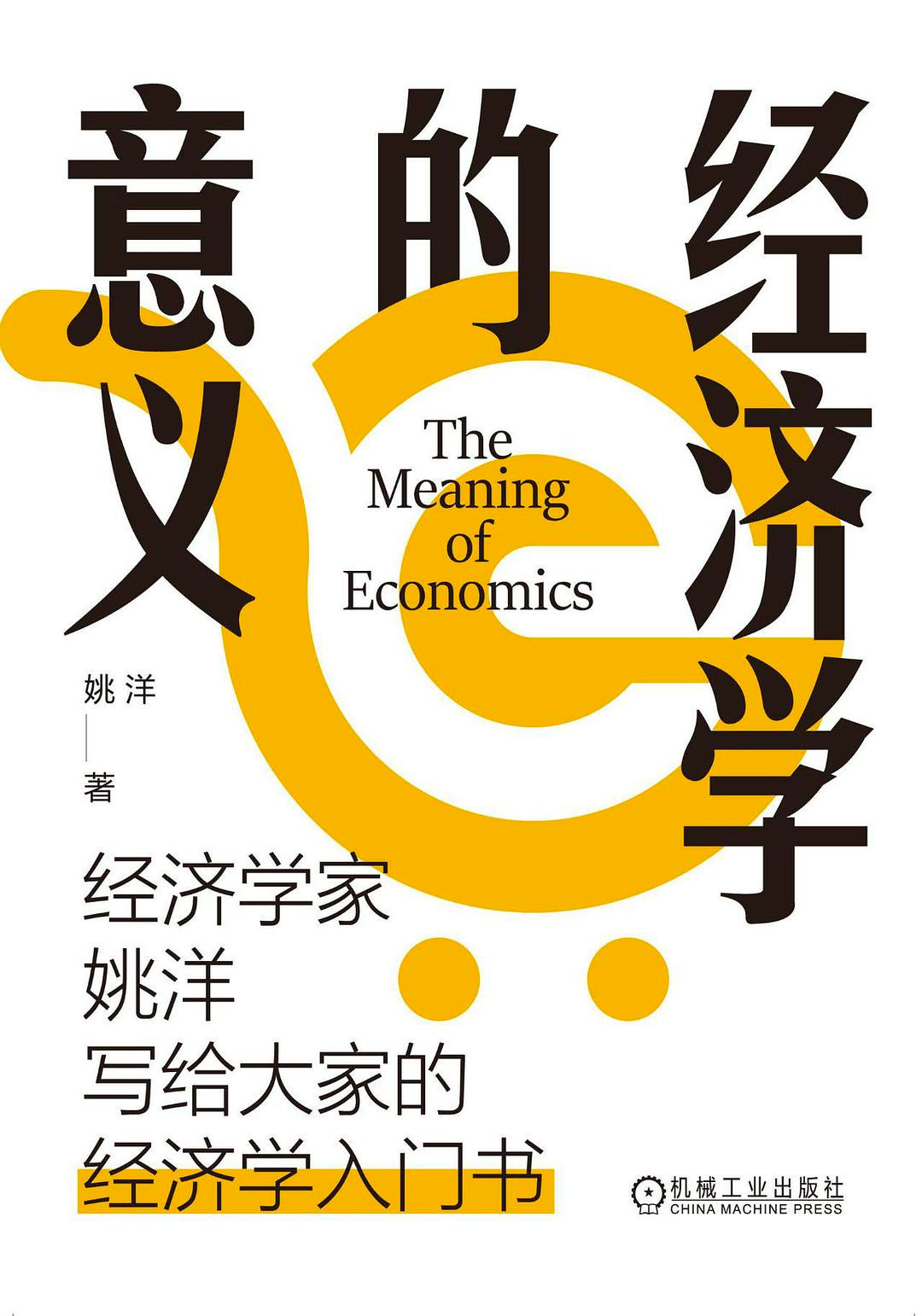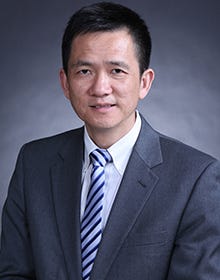Yao Yang on Chinese Economists‘ Contributions to Economics
The senior economist says the contributions are relatively small, but the Chinese have now achieved lift-off and can summarize theories of general significance from China’s particular experience.
Following an earlier post, this is Part II of Chapter 8, entitled 中国经济学的过去、现在和未来 The Past, Present, and Future of Chinese Economics, of Yao Yang's 2023 Chinese-language book 经济学的意义 The Meaning of Economics.
Yao Yang is Liberal Arts Chair Professor; Dean, National School of Development; Executive Director, Institute of South-South Cooperation and Development; Director, China Center for Economic Research at Peking University.
The chapter was first translated and published by David Cowhig, a retired U.S. diplomat who generously authorized me to share his translation, to which we have made a few minor changes.
Cowihg worked 25 years as a U.S. State Department Foreign Service Officer including 10 years at the U.S., Embassy in Beijing and U.S. Consulate General in Chengdu and four years as a China Analyst in the Bureau of Intelligence and Research of the State Department. Before State, he translated Japanese and Chinese scientific and technical books and articles into English for freelance for six years. Before that, he taught English at Tunghai University in Taiwan for three years.
I have also separately consulted with Yao, who agrees to this publication as well.
The Chapter is made of five parts and we plan to share them one by one.
I. The Development of Chinese Economics
II. Contributions of Chinese Economists to the Development of Economics
III. Chinese Economics Today
IV. Which of China’s Problems are Worth Studying by Economists Today?
V. Can a Chinese School of Economics be Formed?
II. Contributions of Chinese Economists to the Development of Economics
Over the past 30 years, Chinese economists have made some significant contributions to the development of economics. I think there are mainly the following contributions.
The first contribution is to research on economic transition. I have been saying earlier that a great theory must be a response to the era in which it is developed. I have repeatedly emphasized this point because I feel that our young scholars do not realize this problem. In the 1990s, the biggest problem in our country was economic transition, and this problem did not only happen in China, but also in Eastern Europe and the Soviet Union. On this issue, domestic scholars such as Mr. Justin Yifu Lin, Mr. Zhou Qiren [books by Zhou Qiren on Amazon.com, some in English translation], Mr. Zhang Weiying, and Mr. Fan Gang have done a good analysis. Among the overseas Chinese scholars, two of them, Qian Yingyi and Xu Chenggang, have done very good research, and they have made remarkable contributions to institutional economics. By the early 2000s, the boom in this field had passed, but it left a very important mark in the history of Chinese economics.
The second contribution was research on fiscal decentralization. The influence of this field is lasting, and the main contributions were made by Mr. Qian Yingyi and Mr. Xu Chenggang. These two teachers are the best theoretical researchers in China, and they are able to highly abstract the real problems in China and then develop theoretical problems. It took 15 years to publish our American Economic Review ( AER) article, and they had an article published in the Journal of Political Economy (JPE), which basically lasted throughout their academic careers. I talked to Mr. Xu Chenggang, and I said it seems like you guys have been writing this article forever, and there was a version of it published in the late 1990s in the European Economic Review (European Economic Review). He said it was even earlier than that, that they had already had the idea when they were students at Harvard, and then they had been discussing it and improving it, and then Roland joined them in writing it. That is to say, this article is the crystallization of their twenty or thirty years of academic career.
Fiscal decentralization is a problem that all countries have to face, and the contributions made by Qian Yingyi and Xu Chenggang in this regard are, I think, very important. Xu Chenggang published a review article on fiscal decentralization in China in the Journal of Economic Literature (JEL) [ VOL. 49, NO. 4, DECEMBER 2011
(pp. 1076-1151) The Fundamental Institutions of China’s Reforms and Development ] . This is a very high honor because publishing in JEL is by invitation and it does not accept submissions. The editor must have contacted the author, so being invited to write a review for the journal must be a recognition of the scholar’s contribution to the field. Until today, Chinese scholars are still doing a lot of research along the direction opened up by fiscal decentralization, and many foreign scholars have also conducted research on other countries, so Qian Yingyi and Xu Chenggang deservedly won the first China Economics Prize from the Foundation for Contemporary Economics in Beijing. 北京当代经济学基金会的第一届中国经济学奖
The third contribution is research on development strategy, which is mainly contributed by Mr. Justin Yifu Lin. I think Mr. Lin’s greatest contribution is in the area of development policy, the theory of which he is still perfecting. [See Justin Lin article pp. 117 – 134 CHINA’S 40 YEARS OF REFORM AND DEVELOPMENT 1978–2018 ] His discussion on development policy has stirred up a thousand waves with one stone. Especially during Mr. Lin’s time as chief economist of the World Bank, he has started a wide-ranging discussion on development economics as a whole. The impact on international aid agencies has been even greater, with Mr. Lin reintroducing the issues that should be of concern when doing international aid. He redefined structuralism, suggesting that strategic choices at different stages of development are very important.
What is the significance of this proposal? Development economics has been mainly concerned with micromechanisms since Schultz, and macro development economics has been ceded to macroeconomists. Development economists are mainly doing micro research, so international aid has also shifted from a macro perspective (e.g., aid for infrastructure development) to a micro perspective (e.g., aid for education, health care, community development, etc.). Later, Mr. and Mrs. Banerjee won the Nobel Prize in Economics, also because they were researching micro development issues. And Justin Lin brought back macro-development economics, emphasizing the need to focus on the issue of strategic choices at the national level. Moreover, he brought industrial policy back into the discussion of economic policy again, which caused a big reaction – industrial policy was no longer discussed in the World Bank at that time. I am now a director of the International Economic Association, and I find that our society is once again discussing industrial policy. It was very visionary of Justin Lin to raise the issue of industrial policy more than ten years ago.
The fourth contribution is the research on officials’ incentives. This is a very Chinese issue because only China has a distinctive system of selecting officials. It is Li Hongbin, and Zhou Li’an and their article published in the Journal of Public Economics [ “Political turnover and economic performance: the incentive role of personnel control in China”] that pioneered the study of officials’ incentives. Before them, someone had written a similar article, but it was not published in a good journal and had little impact.
Readers of the introduction of this article will find that Li Hongbin and Zhou Li’an’s thoughts are along the fiscal decentralization of this literature, they focus on Qian Yingyi’s theory of fiscal decentralization, commenting that the fiscal decentralization by itself is insufficient. One must also bear in mind the incentives facing officials. Of course, these two issues are linked; without decentralization, there is no incentive. Over the past decade or so, there have been quite a few people doing research along this branch of the literature, so Li Hongbin and Zhou Li’an have made contributions to economics. [see their Google Scholar entries]
I am doing research in this area much of the time now, but not primarily on incentives, but rather considering the human capital of officials. Human capital is a very important concept put forward by Theodore Schultz. There is a vast literature on human capital, but very few people have studied the human capital of officials. However, officials play a very important role in the economy, not just in China but around the world. A single decision by an official can raise the country’s economic growth by one or two percentage points, or it can set the country’s economy back by one or two percentage points. My collaborators and I study how officials’ competencies are shaped and how they affect their promotion. Our research also confirms that China’s system of selecting officials is characterized by meritocracy.
The general conception in political science and economics is that the main problem with officials is accountability, and that it is sufficient to have discipline (a system) to keep them in line. China’s experience in promoting officials tells us that the system should not only keep officials in check but also motivate them to do the right thing and give them positive incentives. China’s system of selecting officials has given us a big testing ground to do these studies. These studies are also of world significance, especially for developing countries. International institutions like the World Bank always emphasize building the system first and keeping officials in line; but from the experience of developing countries, some officials are not kept in line at all. We need to reverse our thinking, not only focusing on how to control officials but also thinking about how to incentivize them to do the right thing.
These are some of the contributions that Chinese economists have made to modern economics over the past 30 years. Compared to economists in Europe and the United States, our contributions are relatively small, but after all, we have now achieved lift-off and can summarize theories of general significance from China’s particular experience. If young scholars join the team, we will be able to build our economics in time. However, it seems that there is not enough motivation in Chinese economics nowadays.
Part I
Again, many thanks to David Cowhig‘s translation and generous authorization for me to share it here. Check out his blog!
Separately, The East is Read, a sister newsletter, has published a recent study by Professor David Daokui Li at Tsinghua University, who estimates China’s local govt debt in 2020 was 90 trillion yuan, 50% higher than the World Bank and IMF estimates. I think it’s the first time this study was comprehensively introduced in English.






